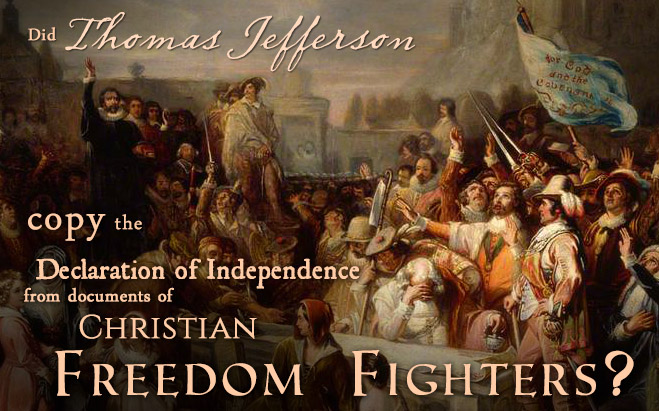 The Scottish National Covenant of 1638 was a contract or covenant with God signed by thousands of Scottish Christian men who swore to defend their freedom in direct defiance of a king who was abridging the religious liberty of the people. The Covenanters demanded a free and independent Scottish parliament and assembly with limits to the King’s power, particularly in matters of faith. The Covenanters also declared that the Kirk, or church, was severed from the King’s authority.
The Scottish National Covenant of 1638 was a contract or covenant with God signed by thousands of Scottish Christian men who swore to defend their freedom in direct defiance of a king who was abridging the religious liberty of the people. The Covenanters demanded a free and independent Scottish parliament and assembly with limits to the King’s power, particularly in matters of faith. The Covenanters also declared that the Kirk, or church, was severed from the King’s authority.
Comparisons Between National Covenant and American Founding Documents
See also Declaration of Arbroath: Comparison between Arbroath & Declaration of Independence
“There is even strong circumstantial evidence that the American founding fathers who drafted the Declaration of Independence and the Constitution actually referred to two antecedent Scottish documents. . . . In fact, a careful comparison of the Arbroath Declaration and the National Covenant against the Declaration of Independence and the Preamble to the United States Constitution readily reveals how the Americans used the words and concepts of the older Scottish documents as models for their momentous works.” (The Mark of the Scotts, Duncan A. Bruce, pg. 38-39)
The United States Declaration of Independence
| Declaration of Independence (1776) | The National Covenant (1638), Read the full document |
| “We . . . Do . . . Solemnly . . . Declare” | “We . . . Do . . . Solemnly Declare” |
| . . . Usurpations, all having in direct Object the Establishment of a absolute tyranny | . . . Usurped authority of . . . all his tyrannous laws |
| That these United Colonies are and of Right ought to be Free and Independent States | . . . that the aforesaid Confessions are to be interpreted and ought to be understood . . . |
| with a firm reliance on the protection of Divine Providence | we call the Living God . . . to witness . . . [and] most humbly beseeching the Lord to strengthen us by His Holy Spirit for this end, and to bless our desires and proceedings with a happy success |
| we mutually pledge to each other | to the mutual defence and assistance every one of us of another |
| our lives, our Fortunes | we promise and swear that we shall to the utmost of our power, with our means and lives |
Preamble to the Constitution of the United States
| Preamble to the Constitution of the United States (1787) | The National Covenant and Act Ordaining It (1638 & 1639), Read the full document |
| We the people of the United States | we noblemen, barons, gentlemen, burgesses, ministers and commons |
| in order to form a more perfect union | considering the great happiness which may flow from a full and perfect union |
| establish justice | ministration of justice amongst us . . . in the defence of Christ His evangel, liberties of our country, ministration of justice, and punishment of iniquity, against all enemies within this realm or without, as we desire our God to be a strong and merciful defender to us in the day of our death, |
| insure domestic tranquility | procure . . . true and perfect peace |
| provide for the common defense | stand to the defence . . and preservation of the aforesaid true religion, liberties and laws of the kingdom; as also to the mutual defence and assistance every one of us of another, in the same cause of maintaining the true religion and His Majesty’s authority, with our best counsels, our bodies, means and whole power, |
| promote the general welfare and secure the blessings of liberty to ourselves and our posterity | to maintain the true worship of God . . . and the peace of the kingdom, for the common happiness of ourselves and posterity. |
| do ordain and establish this Constitution for the United States of America | ordain the Covenant, with this declaration, . . . ordaining, by civil authority, . . . in time coming, to subscribe the foresaid Covenant: that our union may be the more full and perfect, we, by our act and constitution ecclesiastical, do approve the foresaid Covenant in all the heads and clauses thereof; |
Did you know the Declaration of Arbroath also has parallel wording with the Declaration of Independence?
Pin, share or like this article!









One Response
Thank you for this post! There is so much to learn about the history of how other countries fought for religious freedom. We should all be indebted to these brave and true people of Scotland. This is a day that should always be remembered by those who cherish God and the freedom to worship in the way they see fit.